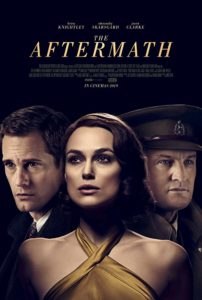The Aftermath
Posted on March 21, 2019 at 5:29 pm
B-| Lowest Recommended Age: | Mature High Schooler |
| MPAA Rating: | Rated R for sexual content/nudity, and violence including some disturbing images |
| Profanity: | Some strong language |
| Alcohol/ Drugs: | Drinking and drunkenness |
| Violence/ Scariness: | Military violence with some disturbing images, brief Holocaust images, characters injured and killed, sad deaths |
| Diversity Issues: | Post-war ethnic hostilities, Holocaust references |
| Date Released to Theaters: | March 22, 2019 |
| Date Released to DVD: | June 24, 2019 |

It takes place in Hamburg, Germany, five months after the end of World War II. The British are occupying the all-but-destroyed city. As residents comb through the rubble, still seeking thousands of missing people, and we are reminded that the Allies dropped more bombs in a week on the city than Germany dropped on the UK for the entire war, creating an uncomfortable parity. An elegant mansion is requisitioned by the occupying forces for its military leader, Lewis Morgan (Jason Clarke) and his wife, Rachel (Keira Knightley).
They allow the former owner of the home, architect Stefan Lubert (Alexander Skarsgård) to live in the attic with his teenage daughter, Freda. Lewis is gone most of the time, trying to maintain order while many Germans are still loyal to Hitler and furious with the Allies and the occupation. Some have burned 88 on their arms (for Heil Hitler, because H is the 8th letter of the alphabet). Rachael spends some time with other Brits stationed there, but she is lonely and still grief-stricken over the death of her young son in a German bombing attack on England.
And then, she begins to see Stefan not as an enemy but as a human, a father, a man of culture, a man mourning his own losses, and also a man who looks very appealing as he chops wood wearing a blue sweater. They are drawn to each other because they are lonely and because each represents for the other a complete break with the past, almost a way to obliterate it.
Author Rhidian Brook based the story on the experiences of his grandfather, which he first sold as a screenplay idea, and then made into a novel while he worked on the script. The issues of transitioning from war to peace, with awkward, useless official inquiries to try to make impossible assignments of guilt, basically asking, “Just how much of a Nazi were you?” are intriguingly raised but not very thoughtfully explored. Lewis is an exemplar of decency and yet cannot comfort his wife. He admits that he has seen and done unspeakable things but cannot talk to his wife about that, either.
There is so much potential here for tying together the issues of the broken city and the broken world and the broken marriage, but instead the focus is on the forbidden romance. As enticing as the steamy love story may be (did I mention the log-chopping scene?), its failure to recognize and address the issues it passes through leave the film, like the home at the center of the story, pretty but empty.
Parents should know that this film includes military and rioter/protest peril and violence with characters injured and killed, some grisly and disturbing images, brief Holocaust photos, some strong language, explicit sexual situations, nudity, non-explicit teen sex, and drinking and drunkenness.
Family discussion: What is the right way to treat citizens of a conquered country? How did Stefan, Lewis, Freda, and Rachael handle grief differently?
If you like this, try: “The Exception” and “Operation Finale”
